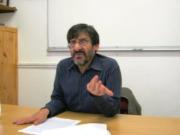
Describing the Israeli–Palestinian conflict as "the central human rights issue on the planet today", Professor Steven Friedman, academic, public intellectual and Director of the Centre for the Study of Democracy addressed members of the Grahamstown community recently on the meaning and relevance of Israeli Apartheid Week (IAW), 5-10 March.
An annual international series of events including rallies, lectures, cultural performances, films and workshops, IAW seeks to raise awareness about Israel's apartheid policies toward Palestinians and to mobilize support for the growing Boycott, Divestment, and Sanctions (BDS) of Israel movement.
“The common perception is that the conflict is one where two groups of people unfortunately just can’t get along very well. This is not just a quarrel between two groups of people who can’t get along. One group of people that is zealously backed by the western world have imposed themselves on another people, taken their land and reduced them to living in circumstances worse than those experienced by some in the apartheid state in South Africa,” Prof Friedman said.
The Israeli–Palestinian conflict that began in the early 20th century forms part of the wider Arab–Israeli conflict with key issues involving mutual recognition, borders, security, water rights, control of Jerusalem, Israeli settlements, Palestinian freedom of movement and legalities concerning refugees.
The violence resulting from the conflict has prompted international actions, as well as other security and human rights concerns, both within and between both sides, and internationally.
Referring to a recent debate of the conflict hosted by SAFM, Prof Friedman explained how most public discourse is skewed in favour of Israel, which is supported by major global political and economic powers.
Calling for a reframing of the conflict in order to portray a realistic view of the violence, Prof Friedman said it is crucial that the gap be narrowed between common perceptions of the violence and the actual reality.
In his presentation Prof Friedman outlined the parallels between the apartheid state and the Israeli state, explaining the only notable exception that certain Palestinians are given the right to vote.
According to Prof Friedman, an analysis of the conflict centring on the behaviour, practices, excuses and justifications of the dominating group, in this case the Israeli majority, uncovers an almost 100% parallel with the apartheid state.
“The same kind of attitudes and rationales you used to hear from Afrikaner nationalists are the ones you hear from Zionists. The system there is almost worse than the apartheid state,” he said.
“We need to reframe this conflict to become about human rights in order to have the same sort of traction the anti-apartheid movement had. The fight for sanctions against the apartheid state was not lead by governments. They were dragged along by certain groups who forced them into action,” he said, suggesting that a similar dynamic may develop in the Israeli-Palestinian conflict.
While Palestine has not seen the emergence of strong liberation movements, the BDS, involving civil society, trade unions, academics, cultural workers and women’s groups may provide a secular alternative and have the capacity to become a viable Palestinian movement.
“In time this movement could take off. In the context where it is not realistic to expect mass Palestinian resistance, the resistance might happen internationally. It is driven by Palestinians and the international community are responding to it. World opinion is being influenced by Palestinian leadership by people who are sympathetic to it,” he said.
By Sarah-Jane Bradfield
Photo: Prof Steven Friedman
Photo by: Anna-Karien Otto
